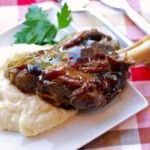
Slow Cooker Lamb Shanks
In this easy recipe, flavorful, tender, fall-off-the-bone lamb shanks are slowly cooked with broth and aromatics until wonderfully tender.
Servings 4 servings
Calories 377kcal
Ingredients
- ½ cup beef broth
- 4 lamb shanks small; about 3 pounds total weight
- 1 teaspoon Diamond Crystal kosher salt or ½ teaspoon of any other salt, including Morton kosher salt
- ¼ teaspoon black pepper
- ½ teaspoon garlic powder
- ½ teaspoon ground cumin
- ½ teaspoon dried rosemary
Instructions
- Add the broth to a 6-quart slow cooker pan.½ cup beef broth
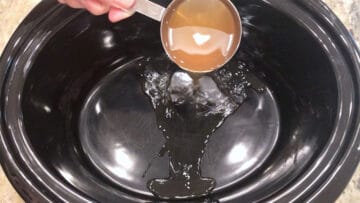
- Season the shanks with salt, pepper, garlic powder, cumin, and rosemary. Place them in your slow cooker.4 lamb shanks, 1 teaspoon Diamond Crystal kosher salt, ¼ teaspoon black pepper, ½ teaspoon garlic powder, ½ teaspoon ground cumin, ½ teaspoon dried rosemary
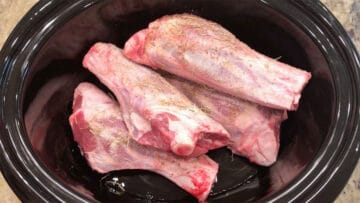
- Cover and cook on HIGH for 4 hours or on LOW for 7 hours until the lamb is very tender. (See the notes below for the cooking time for larger shanks).
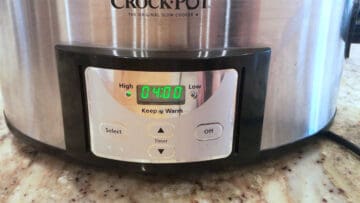
- When the shanks finish cooking, set the slow cooker to WARM.
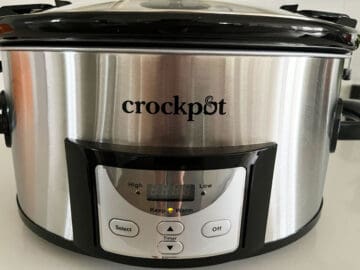
- Transfer the cooked shanks to a plate. Strain the cooking liquids into a glass measuring cup. Return the shanks to the slow cooker pan (carefully wipe it with warm, moist paper towels if needed) and cover to keep the shanks warm while you thicken the gravy.
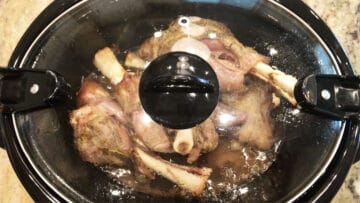
- Use a spoon to skim the fat layer off the top of the cooking juices. Pour them into a medium saucepan. Heat over medium-high heat until almost boiling but not quite, then turn the heat down to medium and simmer, whisking occasionally, until the liquids are reduced into a rich gravy, 10-15 minutes.
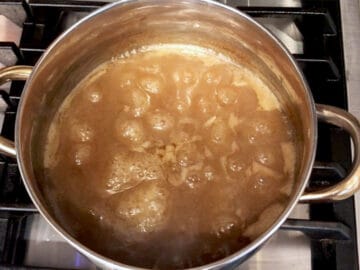
- Transfer the lamb shanks to plates, spoon the gravy on top, and serve.
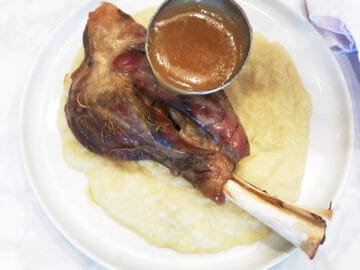
Video
Notes
- Seasonings, especially salt, are guidelines. Adjust to taste.
- If the shanks are frozen, please thaw them completely in the fridge before placing them in the slow cooker.
- There's no need to brown the shanks on the stove before adding them to the slow cooker. I've experimented with browning them first and have found that this extra step is not worth the trouble. The shanks are excellent, with or without browning.
- The shanks I typically use are small - four of them weigh about 3 pounds. If yours are much bigger, you'll need to increase the cooking time, adding 30 minutes on HIGH or one hour on LOW. I also recommend adding ½ extra cup of broth to the pan. Your goal is to cook them until they are fork-tender and falling off the bone, so if they're not quite there yet after this extra time, add more time (and broth) as needed.
- I don't recommend cooking more than six shanks in a 6-quart slow cooker. Overcrowding the slow cooker can cause uneven cooking, leaving some shanks undercooked.
- Oven method: Follow the recipe, but instead of using the slow cooker, bake the shanks tightly covered in a preheated 325°F oven for 2 to 2½ hours, or until the meat is very tender and pulls back from the bone.
- To cook just two shanks, you would need a smaller slow cooker. Alternatively, place the shanks in a small baking dish that fits them snugly, cover the baking dish, place it in the slow cooker, and cook on LOW for 6 hours instead of 7. They might still come out drier than if you had used four shanks, though.
- It's important to skim the fat from the top of the cooking liquids with a spoon before attempting to reduce them. Otherwise, the oil can separate. It's easier to separate the fat from the cooking liquids if you strain them into a measuring cup and place the cup in the freezer for 10-15 minutes. The fat will float to the top and slightly harden, making it easy to remove.
- After removing the fat, cook the liquids patiently over medium heat just until thickened, then immediately turn the heat off. This can take as long as 15 minutes. You can speed up the process by mixing a teaspoon of cornstarch with a tablespoon of cold water and stirring this cornstarch slurry into the cooking liquids.
- You can keep the leftovers in an airtight container in the fridge for up to 4 days. Reheat them, covered, in the microwave at 50% power, turning them midway through reheating. You can also freeze the cooled leftovers in freezer bags for up to three months. Thaw them overnight in the fridge before reheating.
Nutrition
Serving: 1lamb shank | Calories: 377kcal | Protein: 57g | Fat: 15g | Saturated Fat: 7g | Sodium: 502mg